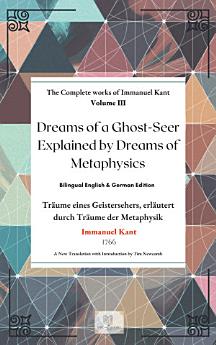Dreams of a Ghost-Seer
Táto e‑kniha
This is Volume III in the Complete Works of Immanuel Kant from LP.
Kants 1766 Träume eines Geistersehers, erläutert durch Träume der Metaphysik is directed to the charlatan metaphysicians of his day, using Swedenborg's claims of spirit-visions as a central example. It is a cynical, scathing, and mocking criticism of Swedenborgian metaphysics, while simultaneously undermining the faulty Epistemology of Leibniz. Kant addresses Mr. Schwedenberg directly analyzes his works methodically. Carl Jung's philosophy is heavily influenced by German Transcendentalism, specifically this work as well, and continued Kants work of making the spiritual acceptable within a materialistic metaphysics. Kant and Hegel both articulate that the human psyche does not operate off of Presuppositional Rationalism, but Symbolism. Kant speaks of Archetypes guiding the pneumatic world. He is sketching out a response to the Aristotelian metaphysics of Hume while upholding the Scientific advances of the Enlightenment. He uses Occams Razor against Swedenborg, using reason to deconstruct his claims. But at the same time, he pushes back against a pure Newtonian mechanical, deterministic worldview: For in the relations of cause and effect, of substance and action, philosophy serves at first to resolve the intricate phenomena and to bring such to simpler conceptions. Schopenhauer wrote a much longer work modeled after this essay titled "Attempt on Spirit-Seeing and what is connected with it"








